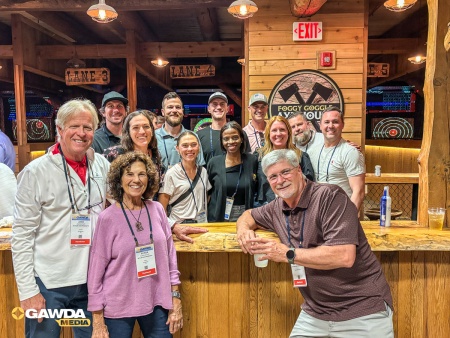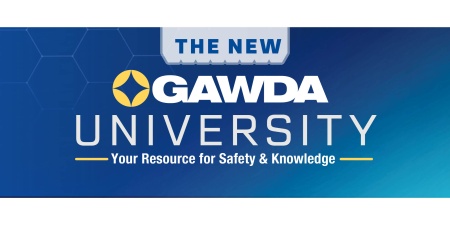Looking Ahead to 2025 In a New Regulatory Environment
Following the 2024 Elections, what can GAWDA members expect from a regulatory standpoint in 2025?
By Tom Badstubner, Marilyn Dempsey, Michael Dodd, Rick Schweitzer, and Steve Guglielmo
Much of the First Quarter Issue of Welding & Gases Today will discuss the impact of the 2024 Elections on the GAWDA Membership. GAWDA members discussed the economic impacts at length in the distributor and supplier forecasts, which can be read on page 58-69. But from a regulatory perspective, the next four years will look very different than the last four, as the Trump administration will have a very different outlook on regulation than the Biden administration did. Here to help us make sense of this new frontier and look ahead to what to expect in 2025 are GAWDA’s consultants. Between the four of them GAWDA’s consultants bring more than 150 years of industry-specific experience to the association.
The GAWDA Consultant Program is a GAWDA member benefit that is included as part of your member dues to the association. It is consistently rated as one of the most valuable member benefits that GAWDA provides. Thank you to Tom Badstubner, GAWDA’s FDA and Medical Gases Consultant, Marilyn Dempsey, DHS, EPA and OSHA Consultant, Mike Dodd, DOT Consultant, and Rick Schweitzer, Government Affairs and Human Resources Consultant, for lending their time and expertise to discuss these important topics. The following is a lightly edited transcript of that conversation.
Welding & Gases Today: With this being the first quarter issue of Welding & Gases Today, is there anything that members need to be cognizant of for the beginning of the year?
Marilyn Dempsey: SARA Title 3 reporting is always due March 1st. Hopefully, members will have made those reporting by the time they read this. I hope GAWDA members have completed their OSHA 300 filings. Because OSHA 300A reports dates are:
- Feb 1 – the physical form must be posted from Feb 1 – Apr 30 in an area accessible by all employees.
- March 2 – Electronic submission March 2
- if the company’s NAICS code is considered high risk and have 20 or more employees
- if the company’s NAICS code is considered high risk and has 100 or more employees then the company must also report 300 and 301 data.
EPA SARA Tier II submissions are due March 1 – for any hazardous material over 10,000#, but remember that the threshold is less for Extremely Hazardous Substances (EHS) as recorded on the List of Lists).
Mike Dodd: From my standpoint, the only thing that is due at the moment is the Unified Carrier Registration. That was due by the end of December, so by the time they read this they’ll be late. But it’s never too late to register, if they forgot! A couple of other points I wanted to make on the Unified Carrier Registration; there are a lot of people that misunderstood that since they don’t leave the state it doesn’t apply to them. We pretty much, over the past year or so, have made it clear that every one of our members is involved in interstate commerce and therefore are all subject to the registration. They need to make sure that they’ve registered. Remember, it’s not about the truck, it’s about the products that they sell, and a lot come in from out of state, which means they’re continuing interstate commerce.
WGT: Tom how about for the FDA, any important dates for members to keep in mind in the beginning of the year?
Tom Badstubner: A couple of things. The new medical gas regulations are required to be implemented by December 18th, so we have a lot of time. The GAWDA Medical Gas SOPs are being revised right now and were introduced to members on January 31. Members should have the latest 2025 version (version 7) of the GAWDA Medical Gas SOP’s downloaded by the summer and at least be looking at them to see if there are things that they need to change. That will give them several months to review the procedures, before they need to have them implemented.
In addition to that, there is the CARES Act reporting for 2024, which is due by the 31st of March, every year. The FDA doesn’t call it the CARES Act. They call it “Reporting Amount of Listed Drugs and Biological Products Under Section 510(j)(3) of the FD&C Act.” Everyone else calls it the “CARES Act.” GAWDA members may have received an email from the FDA about this and might not have understood that it actually means CARES Act reporting. If there are any questions at all, they should call Jody (508-883-0927), who has templates and procedures and can make it easy to report. Those are the current issues and deadlines.
One last thing, this isn’t necessarily a regulatory issue, but it is a good quality practice. At the first part of every year, you should requalify you bulk suppliers for medical and food/beverage gases. You should have a supplier qualification process built into your procedures with certain steps like checking whether they are registered with the FDA, making sure they have a certificate of conformance for food and beverage gases. This early part of the year is the time to do it. And if you have any questions on the process or on what forms to use on supplier assessments give us a call.
WGT: The last couple of times we’ve spoken we’ve touched on a number of things. First, there were some contentious audits happening in different parts of the country. Is there anything that you can share as it pertains to those audits or other audits you may be seeing from the FDA?
Tom: There are some regulatory issues in Florida and some in Arizona that we’re struggling with. GAWDA & CGA are joined in initiatives to communicate with the Boards of Pharmacy in those states. And you can forward any questions you have to me and I’m happy to help you deal with the states, when they have any unusual interpretations. Some states, for example, in Arizona, are sometimes challenging the location of the customers’ license number on the shipping paper/invoice. There is no regulation that says it needs to be in a certain place on the invoice.
WGT: With the Q4 Issue of Welding & Gases Today coming out early ahead of the Annual Convention, it has been a while since we’ve had the opportunity speak last. During that time, have you seen or heard anything in the safety calls or in calls with members that has raised an eyebrow that you can share with members?
Mike: From a DOT standpoint I’m aware of three audits in the last quarter. Two in person, and one remote audit. That number seems to be down. I would call it being very quiet from a DOT auditing standpoint in comparison with the past. That is good. Quiet is good.
WGT: Rick, we’ve spent all year last year speculating about what would happen with the election. Was it going to be status quo or is it going to be what we went through from 2016-2020. Now, we obviously have an answer. We have a bit of clarity on what things are going to look like. For GAWDA members, what will the new Congress and a second Trump term mean for business, in your opinion?
Rick Schweitzer: From a regulatory standpoint, the Trump administration is going to be a whole new world compared to the previous four years. Some of it will look like the first Trump administration. Other parts will not. The Biden administration focused on labor and environmental issues. Let me address those first. I think Trump ran on securing the Southern border and the border with Canada. I think the administration can argue that border security is a labor issue. By restricting immigration into the U.S., it promotes the U.S. labor force. We did see in the first Trump administration that real wages did increase for workers, particularly in the lower wage jobs. Improving border security will, most likely improve wages for entry level employees.
Also on the labor front, we’ve seen the FTC’s ban on non-compete agreements enjoined in courts. I don’t think the Trump administration is going to defend that non-compete ban. That is going to go away. Similarly, the Department of Labor’s increase in the thresholds for overtime administration for Executive, Administrative, and Professional employees has been enjoined by at least one court. I don’t think the Trump administration is going to defend that in court. I think it will remain at the current levels. For things like State meal and rest break requirements for commercial and motor vehicle drivers, those things have been preempted by the Federal Motor Carrier Safety Administration. The Biden administration considered multiple requests to waive preemption of meal and rest break requirements with regard to general freight trucking but never granted the waivers before leaving office. There is still a court challenge to the FMCSA preemption decision, but that will likely be dismissed.
On Environmental issues, with regards to this industry, probably the vehicle mandates, or quasi-mandates, are the most compelling at this point. The EPA’s greenhouse gas phase-3 rule has been finalized. It has been challenged in court. It’s supposed to go into effect beginning with the 2027 model years for medium and heavy-duty vehicles. The initial brief has been filed by the appellate and it looks like they have very strong arguments. It would not surprise me at all if the greenhouse gas rule were struck down by the courts for lack of authority at the EPA. We also have a couple of California initiatives. One on the truck manufacturers side that essentially bans the sale of internal combustion engines for the truck market in California by 2036, called the Advanced Clean Trucks rule. It’s already gone into effect. They’ve already gotten a waiver from the EPA to impose this, but the Trump Administration will likely conduct a rulemaking to withdraw the waiver. From the user side, there is a similar ban on using or purchasing internal combustion engines by 2036, running up to 2045. That is the Advanced Clean Fleets rule. That waiver request was rescinded by the California Air Resources Board (CARB) in early January.
There is also an antitrust suit in Nebraska against the truck manufacturers for agreeing with California to comply with the CARB production restrictions on selling internal combustion engines, even if the California rules are struck down in court and even in states that do not adopt the California rules. The Nebraska attorney general claims, and I think it’s a legitimate argument, that this is a commercial deal, and therefore it is agreement in restraint of trade, which is a violation of the Sherman Act. That will all be sorted out in the next year in the courts and in the White House, probably with very little interaction with Congress.
A couple of other things to address. One is the OSHA heat, illness and injury proposed rule. The comment deadline was previously extended to January 14th. If the Trump administration goes through with a final rule in this area, I think it will be substantially revised from what the Biden administration has proposed. The one thing that they will clearly have eliminated would be a proposed requirement for paid breaks for employees to address heat issues. I also think they would substantially revise or eliminate a lot of the monitoring/record-keeping requirements in the proposals. It’s still up in the air, in my mind, whether the Trump Administration would even pursue a final rule, particularly since the White House has issued an Executive Order directing agencies to delete ten rules for every one new rule issued.
The big issue that will impact petroleum and natural gas, propane, any other petroleum related products or industries is the question of tariffs. The Trump administration has proposed, particularly with regard to Canada, 25% across the board tariffs on all Canadian imports into the U.S. They later dropped the proposal to 10% for petroleum products, and then delayed the tariff effective date for 30 days while Canada addressed its border issues. It’s very clear that the intent of this is to drive Canadian policy on border security and drug trafficking across the northern U.S. border, particularly fentanyl. The question is whether or not these tariffs will go into effect and, if they do, what is the likely response from the Canadian Government? Obviously, there will be a tariff war, and it will have a tremendous impact on cross border trade in petroleum, natural gas and refined products. It will substantially increase the cost of those products and anything that uses those products. As I’ve been told by trade experts, the first quarter of 2025 is going to be rocky in that industry. We don’t know what’s going to happen.
WGT: Obviously a lot to unpack there. But for GAWDA members, without making any sweeping generalizations of whether this is good or bad politics, it sounds like it’s going to be a positive business climate?
Rick: Yes. Looking back at the first Trump administration it was more business friendly than not. The impacts of things like tariffs could have detrimental effects on prices, depending on your position and your supply chain. If you have a supply chain that goes through China, that will be negatively affected. One of the things the administration wants to do is to stop Chinese companies from manufacturing in Mexico and then claiming that their products are Mexican in origin and taking advantage of the trilateral trade agreement with Canada and Mexico to sell those products into the United States. They’re going to redefine country of origin definitions to exclude those Chinese manufactured products in Mexico. There will be winners and losers. But, generally, from a regulatory standpoint, I expect this to be a pro-business environment.
WGT: During COVID, GAWDA started doing the monthly online Safety Calls. Even once COVID waned as a threat, we continued to hold those calls. Has participation in those calls remained strong and engaged?
Tom: During COVID it was really high.
Rick: My sense is that it has remained steady. The Board considers every Board meeting whether or not to continue the Safety Meetings. They have consistently said yes, this is a valuable member asset. We will continue forward with the monthly consultant calls. It’s driven a lot of traffic to the consultants. It puts us in front of the members and has generated additional calls and questions.
WGT: Can you give me an example of an interesting question or topic that has come out of the recent calls? For those members who haven’t been tuning into the monthly calls, why do you feel that they should be?
Mike: I can give you several. In the last few calls we’ve had, I tend to talk about record keeping. But I’ve also done a lot of drug and alcohol items that I’ve talked about. That generates questions and calls to me and then I turn and pass those onto Rick, several times, for either confirmation of the opinion or it gets to be a Human Resource issue about whether to retain a driver or not. So, we’ve had several discussions that have resulted in questions. Sometimes they’re on the call but oftentimes I get the emails or a phone call after the call so it’s more private.
Rick: I’ve had experience with, for instance, when the Federal Trade Commission ban on the non-compete agreements was working its way through the courts, I got a number of calls from member companies from the employer and the employee side asking whether or not what they had was enforceable and what they should do going forward. And, again, they felt more comfortable contacting me independently from the GAWDA sessions.
Tom: We’ve had members ask about the new regulations, particularly implementing what the new oxygen labels will look like. That question came directly out of the consultant’s forums.
Marilyn: I received several calls about our industry’s bane of existence — segregation and securement. As long as we have cylinders, we’ll be challenged by segregation distances, and some authorities will try to force cylinder securement. Fortunately, we have documentation from OSHA that excludes Welding Gas distributors.
WGT: They’ll hear something on the call and that will spur action in their mind to say, “oh I wonder how this impacts me?” And it spurs a follow up?
Rick: I’ve talked about reclassification of marijuana at the federal level. That doesn’t impact many member companies but what it does generate are calls on state laws regarding marijuana both for truck drivers but also non-driver employees. What should their policies be? Obviously, it depends on which state they’re in. I’ve advised a number of companies on how to address or reconfigure marijuana policies going forward.
Marilyn: I’ve received calls about the pending new Heat Illness Prevention Plan, especially from companies on the West Coast, where they already have a similar regulation.









